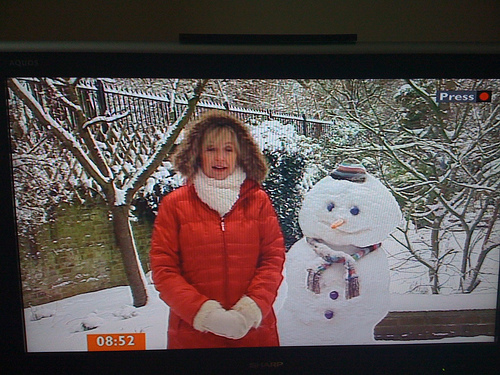Since the last time I wrote about the folks on TV who report the weather, a lot has changed.
Five years ago, just over half of weathercasters (54 percent) said global warming is happening. A whopping 25 percent said it isn’t, and, perhaps more surprisingly, 21 percent said they didn’t know. Today, 9 in 10 TV weathercasters say climate change is happening. That’s based on the latest survey of TV weather forecasters and meteorologists by the Yale/George Mason Center for Climate Change Communication (they did the one in 2010, too, and have revised the methodology a bit).
A quick reminder why this matters: first, 60 percent of Americans go first to local TV for weather news, often multiple times in a day. second, 84 percent “try to keep up” with news about traffic and weather, compared to two-thirds for most other topics, including politics, environment, and the economy. Third, traffic and weather updates are the top reasons that Americans of all ages tune in to news media at all (natural disasters rank second). Forth, 4 in 10 news broadcasts lead with weather, and weather and traffic take up nearly a third of the total broadcast. Finally, weathercasters are among the messengers that Americans trust the most for climate-related information.
[prettyquote align=right]”Today, 9 in 10 TV weathercasters say #climatechange is happening.”[/prettyquote]
Back to the sea change. Sure, times have changed: generally, more Americans know more and worry more about climate change now. But this dramatic shift in weathercasters’ attitudes didn’t just happen magically, nor as a matter of course. Forecast the Facts has been busy daylighting deniers and insisting that weathercasters accurately report climate facts to their viewers. Their most effective accountability measure has been to publicize some of the most ridiculous pronouncements about climate change made by TV weathercasters.
Meanwhile, since 2012, Climate Central’s Climate Matters program has been working with weathercasters and providing them much needed resources, like videos, trainings, and graphics, to help them be more consistent and informed messengers about climate change (the first Yale/George Mason survey had helped to identify these needs). Over 200 US weathercasters participate in Climate Matters and, in partnership with Weather Company subsidiary WSI, Climate Matters distributes its materials to the majority of the nation’s TV weather forecasters.
Professional organizations like the American Meteorological Society have also focused on climate education in their member resources and at annual conferences. In addition, several high profile weathercasters have been increasingly outspoken about climate impacts, including Al Roker and Paul Douglas, “the evangelical Christian Republican poster boy for climate change.”
The survey indicates real change, but there are areas, as with the rest of Americans, where there is still work to be done. Here are some of the key findings:
- More than 9 in 10 TV weathercasters acknowledge that climate change is happening. Only 1 in 10 say climate change is not happening (4 percent) or said they don’t know (5 percent).
- Of TV weathercasters who say it’s happening, nearly 9 in 10 think human activity is at least partly responsible over the past 50 years. Five years ago, this figure was just 65 percent.
- Notably, weathercasters underestimate the extent of the scientific consensus on human-caused climate change.
- Most TV weathercasters think that climate change has influenced the weather and other conditions in their area over the past 50 years, and even more think climate change will influence the weather in their area over the next 50 years.
- Nearly half think that climate change has had an impact on water resources and agriculture.
- Smaller shares of weathercasters think that transportation and human health have been impacted in their area over the last 50 years, but nearly half think people’s health will be harmed over the next 50 years.
- Fewer than 1 in 10 TV weathercasters are highly optimistic about the prospects for limiting additional climate change over the next 50 years, even if mitigation actions are taken. Further, only about 2 in 10 are highly optimistic about the prospects for avoiding harmful impacts of climate change in the United States, if adaptation measures are taken.
- Nearly 7 in 10 TV weathercasters think it is appropriate for them to report the science of climate change to their audience, at least in some venues.
- More than 90 percent of TV weathercasters think that their audience is at least somewhat interested in learning about the local impacts of climate change, although only 2 in 10 see their audience as highly interested.
- Many TV weathercasters have used one or more kinds of media platforms over the past year to inform their viewers about the local impacts of climate change.
A copy of the full report, A National Survey of Broadcast Meteorologists About Climate Change: Initial Findings, can be downloaded here.


Comments are closed.